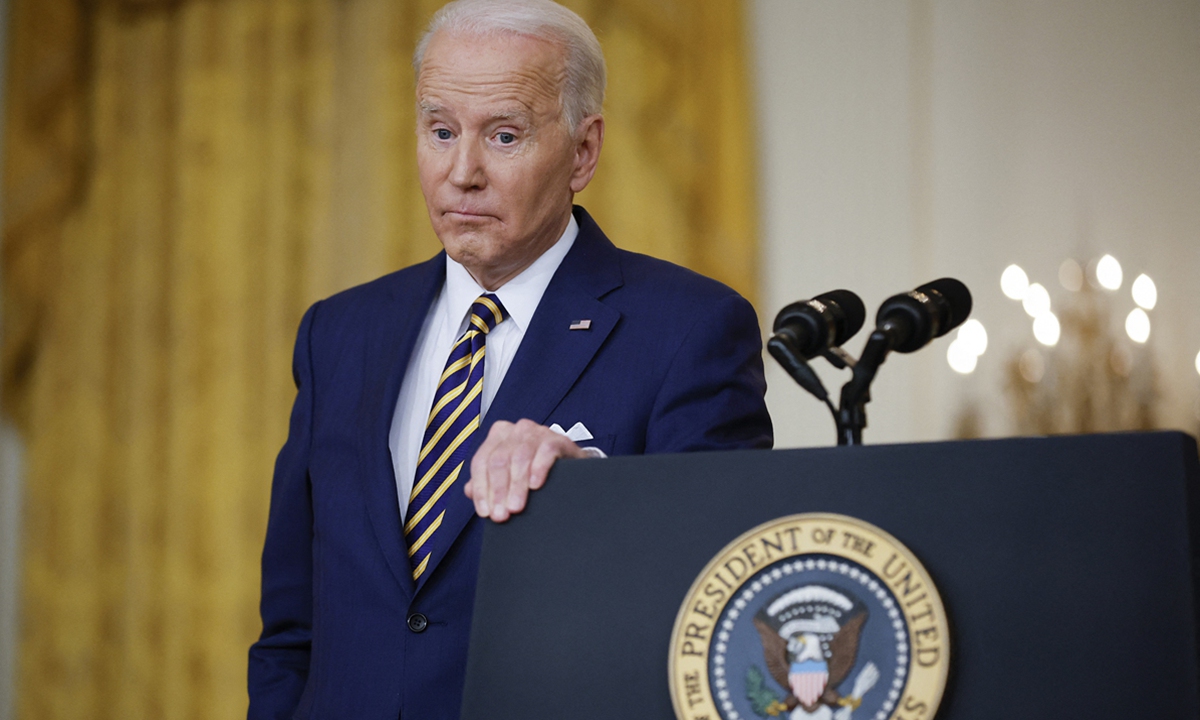
US President Joe Biden Photo: AFP
In a CBS 60 Minutes interview broadcast on Sunday, US President Joe Biden said US forces would defend Taiwan in the event of a Chinese invasion.
This is not the first time Biden has made such remarks. And the White House rushed to make a clarification. One mistake may be an accident, but if similar mistakes are repeated, it will surely become routinized and even normal.
Given domestic political factors in the US, Biden's statement is a choice out of necessity. With midterm elections approaching, against the backdrop of Biden's declining approval rating, Biden hopes that his hard-line stance on China can ease electoral pressure from his opponents. Playing the card of "anti-China and pro-Taiwan" to gain more support is a common tactic exploited by US politicians. This has become political inertia, and to be "anti-China and pro-Taiwan" has also become a form of political correctness.
However, in the context of Biden "defending" Taiwan, he did not clarify how to and in which way the US would intervene. In fact, the US cannot, and is reluctant as well, to make it clear. This is because the US is aware that it is detrimental for the US to shift from strategic ambiguity to strategic clarity. If the US publicly helps defend Taiwan island, "Taiwan independence" forces will benefit the most, while the US, which will be pulled into the water, will have to face a passive situation. The US cannot allow Taiwan to lead it by the nose. Instead, the US only uses "Taiwan independence" forces to achieve the goal of containing China and hindering China's reunification process.
According to Yuan Zheng, deputy director and a senior fellow of the Institute of American Studies at the Chinese Academy of Social Sciences, in the context of the Ukraine crisis, the confidence of the US seems to have risen. The US intends to use the Russia-Ukraine conflict to bring down Russia, and copy this strategy to the cross-Taiwan Straits situation, in a bid to contain the Chinese mainland. The US seems to have tasted the "sweetness" of the Russia-Ukraine conflict that has lasted for months. Without sending its own troops, the US' military and financial aid to Ukraine has not only boosted the arms trade, but also gained the support of a number of allies to sanction Russia.
"Although the Taiwan question is completely different in nature from the Ukraine crisis, it is essentially a contest between two major powers. From the perspective of Washington, proxy wars can best serve its interests. The Biden administration's true intent is to turn Taiwan into a porcupine and increase the Chinese mainland's cost to reunify with the Taiwan island. This is complementary to the purpose of the Taiwan Policy Act, which the US Senate Committee on Foreign Relations recently approved," said Yuan.
The US believes that Taiwan's permanent separation from the Chinese mainland is in the best interests of the US, and the Chinese mainland may not use force after considering the possible costs involved. Therefore, the US has deliberately created strategic confusion in its stance on Taiwan. The US indicates it adheres to the one-China position, but it does the exact opposite in practice. On the one hand, the US says it opposes "Taiwan independence," and on the other hand, it says that "Taiwan makes their own judgments about their independence." The US' schizophrenia on the Taiwan question shows that it wants to cause anxiety in China and create more problems and troubles within China.
This move by the US is sinful. Taiwan is not in the core interests of the US, and the US will not go all out on the Taiwan question. The US does not have the determination and will to confront China hard on the Taiwan question. The actions of the US are actually putting Taiwan on the fire. But for the Chinese mainland, Taiwan is a core interest.
Su Xiaohui, deputy director of the Department for International and Strategic Studies, China Institute of International Studies, believes that when the US provokes wantonly, it causes more damages to its own image. When the US arbitrarily instigates international rules, the international community will have more distrust in the US.
After US house speaker Nancy Pelosi's provocative visit to Taiwan island, many countries and organizations have voiced their support for the one-China principle, exposing the ill intentions of the US. Hence, on the question of the reunification of China, the Chinese mainland must have firm confidence and corresponding capabilities.
Achieving peaceful reunification is the long-term principle of the Chinese mainland, but we will not renounce the use of force, and we reserve the option of taking all necessary measures. We will always be ready to respond with the use of force or other necessary means to interference by external forces or radical action by separatist elements.
For the US, a military confrontation with China is not something to be taken lightly. Biden can make a "slip of the tongue" several times, but he does not dare to make a "slip of the heart."




